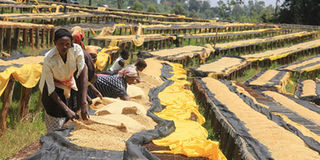Let proposed raw coffee export ban not go the painful nut way

Workers at Rumukia Coffee Mills in Mukurwe-ini, Nyeri dry coffee in readiness for processing. PHOTO | FILE | NATION MEDIA GROUP
What you need to know:
- Export of processed coffee would mean more money in the pockets of farmers and higher foreign exchange earnings for the country.
- Processors will be empowered to dictate exploitative prices locally.
- The cartel will be able to collude and keep for themselves all the gains from global sales while farmers are reduced to penury.
The law proposed by Gatundu South MP Moses Kuria that would bar the export of raw coffee seems to be a good thing.
It has received wholesome support from Deputy President William Ruto, which means it will be received in the National Assembly almost as an official government initiative rather than a mere Private Member’s Bill. More on that later.
Export of processed coffee would add great value to the Kenyan produce. It would mean more money in the pockets of farmers and higher foreign exchange earnings for the country.
It would also go some way towards transforming the country from an exporter of raw produce to an exporter of value-added finished goods. Sounds great, but that’s only on the surface.
The big winners, if Mr Kuria’s Crops (Amendment) Bill is passed, will not be farmers he claims to be fighting for but a small cartel of profiteers.
CARTELS
Processors will be empowered to dictate exploitative prices locally. The cartel will be able to collude and keep for themselves all the gains from global sales while farmers are reduced to penury.
The MP himself let the cat out of the bag when he alluded to previous bans on export of unprocessed macadamia, as well as cashew and other nuts.
The fact is that those bans were imposed specifically for the benefit of the cartel which gained a stranglehold on the market.
Anyone who cared to visit the cashew-growing regions at the Coast might be reduced to tears by the absolute poverty of the farmers.
They have been left with no choice but to sell their produce for peanuts to the price-fixing local cartels yet there are foreign buyers from China, Japan, Europe and the United States ready and willing to buy them at much better rates.
Walk into a supermarket in Kenya today and you will pay the proverbial arm and a leg for a packet Kenyan cashew nuts.
SWIMMING IN MILLIONS
As you enjoy your snack, you might imagine that our cashew farmers are swimming in millions — until you visit Kwale or Kilifi and realise that the high retail prices do not trickle down.
It’s only the processors who make a killing from the nuts.
Exactly the same thing will happen if similar export bans are applied to coffee. Actually, it is criminal that the 2009 ban on export of raw macadamia and cashew, pistachio and oyster nuts was allowed to impoverish farmers for so long.
The ban was imposed by none other the self-same Mr Ruto when he served as Minister for Agriculture.
When Dr Sally Kosgei succeeded Mr Ruto at the ministry in 2010, one of the first things she did was to lift the export ban in order to “facilitate mop-up of the excess raw nuts with farmers”.
Yes, the export ban had left nuts rotting in the fields because the local processors were unable to take up all the produce yet farmers could not access ready international markets.
LEGISLATIVE ENFORCEMENT
Soon after, the Parliamentary Committee on Agriculture, then led by Mr John Mututho, declared that it was investigating Dr Kosgei following complaints from the industry. What they did not say is that the complaints came from the processors, not the farmers.
The following year, 2011, a clutch of MPs from the main macadamia-growing regions in Murang’a and Embu started a campaign for imposition of the ban on raw nut exports.
They argued that the country had the capacity to process and export value-added products but completely ignored the fact that, at the same time, cashew farmers at the Coast were reeling from the ban on the export of raw nuts. The government had made them captive to local processors, who didn’t have the capacity to take up all the produce.
It was instructive at the time that the MPs were speaking at the premises of a major nut processor, who, obviously, would have been happy to sponsor legislative enforcement for the ban on export of raw produce.
It might be coincidental that some of the major nut processors are also into coffee processing and would, therefore, reap big from a similar stranglehold on that sector.
RESTRICTIVE LAWS
They push restrictive laws in selfish self-interest, not for the benefit of farmers.
It is, indeed, unjust that only three per cent of Kenyan coffee is processed at home and that local farmers do not get the full value of produce that fetches premium prices globally.
That must stand as an indictment of local processors. Their inefficiencies must not provide the excuse for export bans that will allow them to exploit local farmers.
If the processors mean well, let them demonstrate that they have the capacity to pay farmers well and to serve the world market with ‘Made in Kenya’ coffee brands.
They must do that without unfair protection.
[email protected] Twitter: @MachariaGaitho




